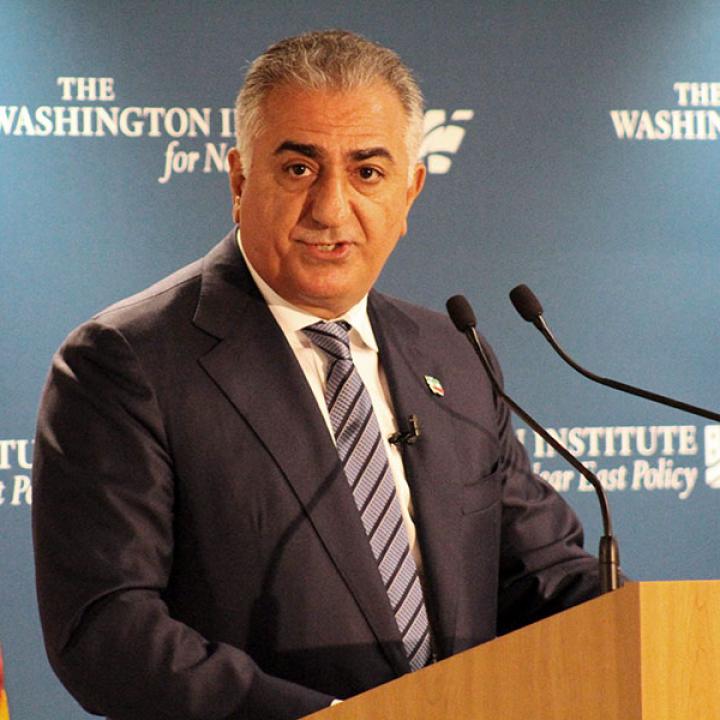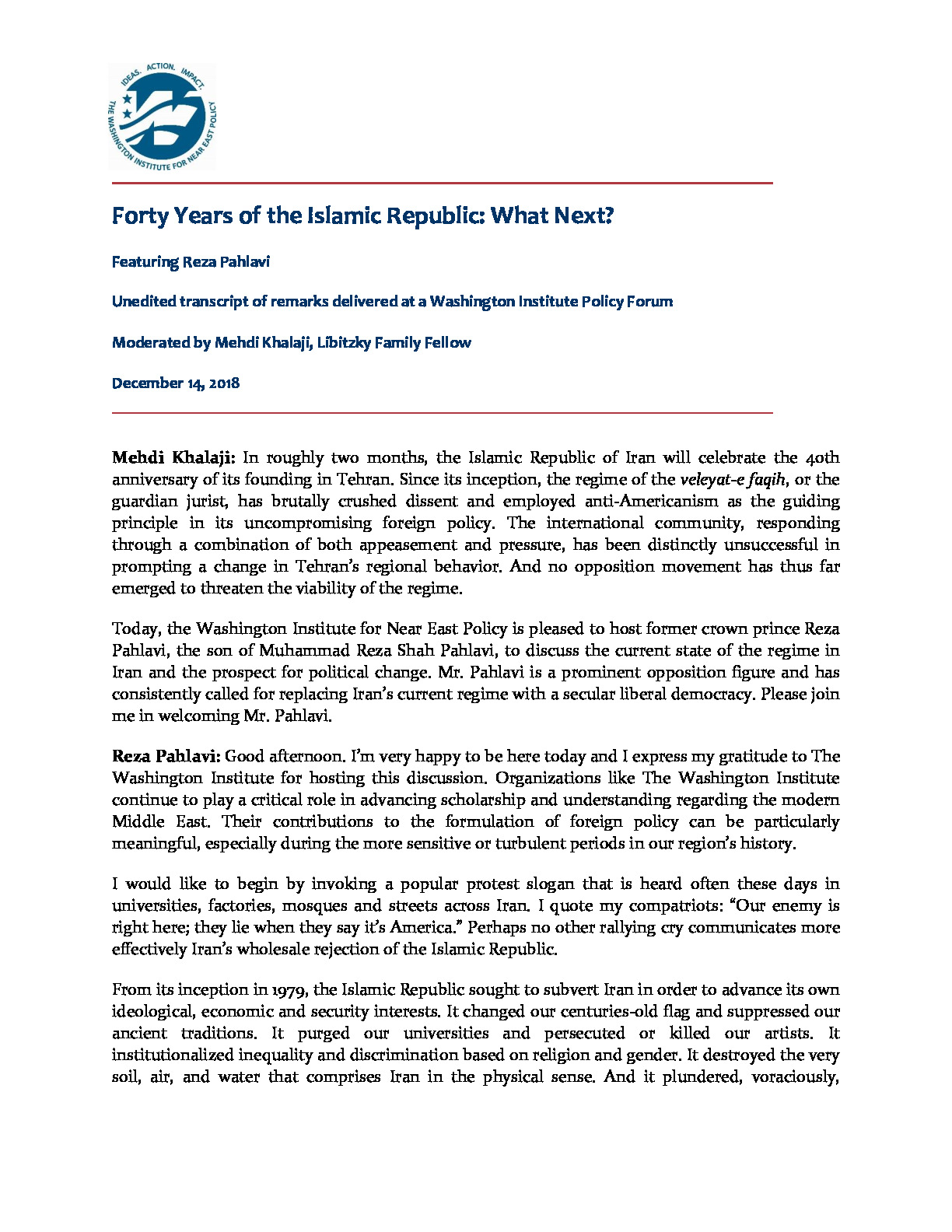

What are the prospects for liberal democracy in Iran, and what can the international community do to help the ongoing protest movement? Watch video or download a full transcript of this special event.
On December 14, Reza Pahlavi, son of the late Muhammad Reza Shah Pahlavi, addressed a Policy Forum at The Washington Institute. The following is a rapporteur’s summary of his remarks. To read a full transcript, download the PDF version.
Since its inception in 1979, the Islamic Republic has furthered its own ideological and economic interests at the expense of the Iranian people. Domestically, it has suppressed ancient traditions, persecuted women and religious minorities through institutionalized discrimination, and funneled the national wealth to a class of kleptocrats who are out of touch with the hopes and dreams of the people.
The regime’s systematic corruption and human rights abuses do not stop at Iran’s borders. For decades, it has viewed the mission of exporting the Islamic Revolution as central to its survival. Accordingly, it has invested heavily in paramilitary and proxy forces around the Middle East, fueled wars with the goal of destabilizing neighboring states, and sponsored terrorist attacks around the world.
Yet despite the severe repression and life-threatening risks, Iranians have embarked on a new chapter in their struggle against the regime, confronting their oppressors through a sustained and widespread civil disobedience campaign. The people have made it clear—they want their dignity and their country back.
This movement has created a historic opportunity for the international community. A democratic Iran would represent its people’s wishes and would therefore behave far differently in the region. For evidence, one need only listen to what Iranian protestors have been chanting tirelessly for months: “Neither for Gaza nor for Lebanon, I will die only for Iran,” and “Syria and Palestine are the reason for our misery.” If the international community is committed to countering the regime’s regional behavior, it will find a natural ally in the Iranian people.
Iranians have also displayed their wholesale rejection of the Islamic Republic through their public refusal to behave in accordance with its ideology. For example, many of them sidestep or jump over American and Israeli flags painted on the floors of universities around the country. They also chant “our enemy is right here, they lie when they say it is America.” Such actions demonstrate Iranian goodwill, much to the dissatisfaction of the country’s rulers. They also highlight the stark divide between the desires of the people and those of their oppressors.
The regime’s response to such dissatisfaction and unrest has been predictable: censorship, imprisonment, and even execution. This response is not a sign of maintaining control, it is a sign of complete insecurity, and the fact that the regime has no solutions to offer its people.
Iran is very close to implosion, but a few ingredients are missing before the situation can move toward regime change. One ingredient is a widespread refusal by paramilitary and military forces to suppress protests. Resistance to the regime would greatly intensify if these forces decided they want to join the people and be part of the solution rather than instruments of abuse. In this regard, opposition leaders need to be clear that regime change will not result in vengeance being taken against these forces. The vast majority of Iranians in the Basij and other suppressive organizations are simply taking orders. Moreover, these personnel should be reminded that they would benefit from regime change as much as other Iranians, since many of them are not receiving their wages on time and are still expected to complete the awful work of punishing their own compatriots for peacefully protesting.
Another necessary ingredient is better organization within the democratic opposition movement. Much of the movement’s leadership already exists inside Iran, but it is unlikely to emerge in full until the tide shifts in favor of the protesters. The democratic opposition outside Iran needs greater coordination as well. One outside group that has been unwilling to cooperate with democratic forces is the Mujahedin-e Khalq (MEK), whose leaders do not seem to share the vision of a liberal, democratic Iran.
For four decades, the international community has employed a combination of pressure and appeasement in the hope of convincing the regime to change. Yet the Iranian people have discovered firsthand that the regime cannot be reformed, and is therefore a threat to the nation of Iran. As their struggle to take back their country continues, international support and assistance is critical. Any foreign policy toward Iran should account for the reality that the people will ultimately win their struggle—an inevitability epitomized by the protest chant “We may die, we may die, but we will reclaim Iran.”
To ensure that the outcome of this revolution is both egalitarian and lasting, the democratic opposition must play a guiding role. Rather than wait for circumstances that result in chaos and disorder, opposition leaders would prefer to take part in a controlled implosion. This outlook is quite different from that held by many Iranians leading up to the 1979 revolution, when some wanted to overthrow the shah but had no idea what they wanted in his place. Ruhollah Khomeini took advantage of this opposition to further his own goals. Today, the people want to proceed through a more transparent process, establishing a secular, democratic government built on the guarantees of universal human rights and rule of law.
To support this goal, the United States and other democracies have many tools and options at their disposal. For one, they can do far better in their messaging to Iran. Many taxpayer-funded outlets in the United States and Britain tend to echo reformist sentiment, which does more to promote regime talking points than reinforce what the people want from their representatives. Moreover, countries that hold assets owned or controlled by the regime can freeze them to help protesters inside Iran.
At the same time, U.S. and allied sanctions should attempt to separate regime officials from the people. For instance, many Iranians living abroad are unable to send money to their suffering families back home because such transactions are barred under current restrictions. Elsewhere, American technology companies that have the means of circumventing regime censorship cannot institute such measures in Iran because they would violate current sanctions.
Ultimately, the international community needs to accept two stark truths: Iran will not be able to establish a true democracy as long as this regime exists, and the people will not be able to overthrow it without foreign assistance. Leaders around the world have yet to express publicly that they support the protestors in their current struggle, and Iranians have noticed this silence. A simple change in rhetoric alone would significantly boost their efforts and morale.
In addition to voicing support, the international community should demonstrate its willingness to engage not only with regime representatives, but also with the democratic opposition. I have not yet met with the current U.S. administration myself, but I join other opposition figures in welcoming the opportunity to communicate our ideas and suggest ways of reaching out to the democratic opposition inside and outside Iran.
This summary was prepared by Arjan Ganji.




